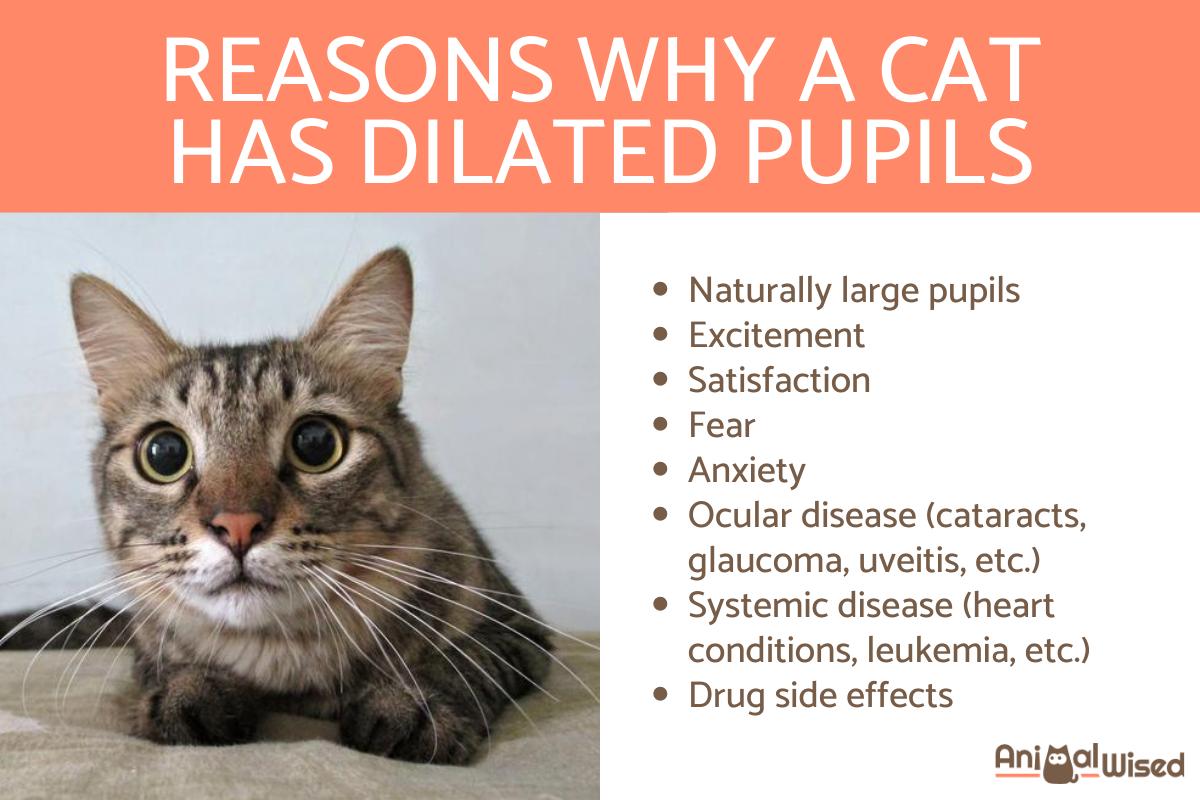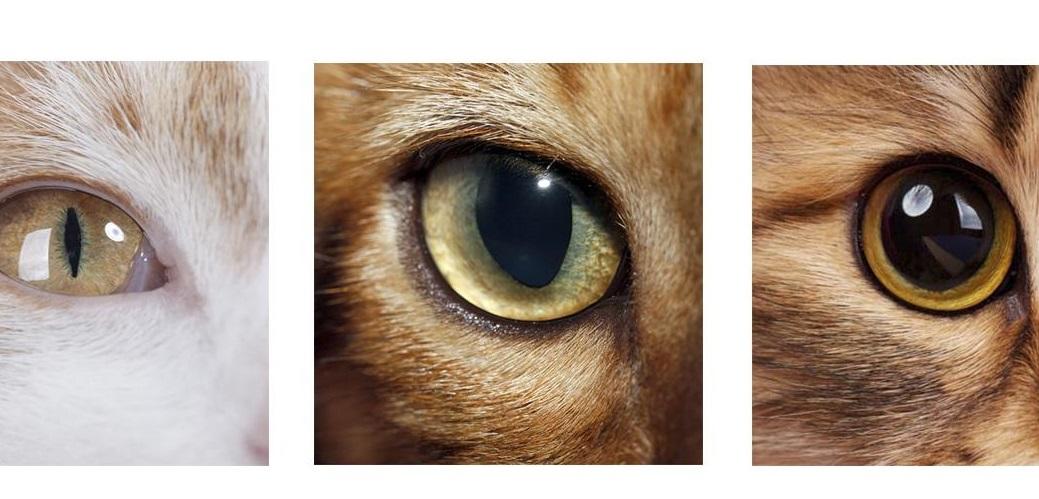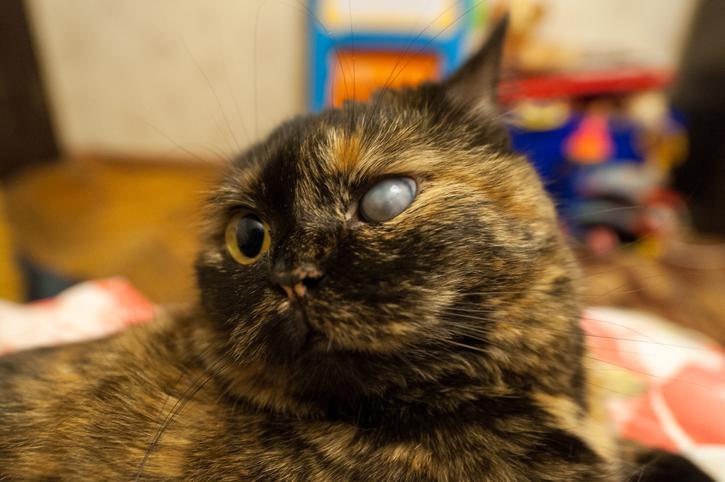Why Does My Cat Have Dilated Pupils?



See files for Cats
In addition to body language and vocalizations, cats use their eyes to communicate. Facial expressions are used to intimate meaning to us, other cats and animals of different species. For many, a feline’s gaze is one of the most mysterious. This is often due to characteristic width of their pupils. This is especially so when they are dilated. But exactly what does it mean if they are completely round? And what if their pupils always seem to be dilated or are a symptom of a condition (mydriasis)?
In general, pupils of cats tend to resemble a vertical line, not a circle. It is not surprising that when witnessing this change cat guardians become alarmed. In this AnimalWised article, we will discuss why your cat has dilated pupils by showing its meaning, its main causes and whether they need any treatment.
- Reasons for dilated pupils in cats
- Types of pupil size in cats
- Why are my cat's eyes dilated?
- Cats with dilated pupils due to health problems
- Anisocoria in cats (one pupil larger than the other)
- Dilated pupils in cats due to glaucoma and other ocular pathologies
- Cats with dilated pupils due to kidney failure
- Dilated pupils as a side effect of medication
- Tips for cleaning a cat's eyes
Reasons for dilated pupils in cats
Pupil dilation doesn't necessarily signify a problem. There are natural reasons for big pupils in cats, especially since light entering the eye causes a natural change in pupil size. When the dilated pupils are sustained over a long time, even when the ambient light changes, there may be other reasons for the phenomenon. To better understand, we need to consider:
- Types of pupil size in cats
- Why are my cat's eyes dilated?
- Cats with dilated pupils due to health problems
- Anisocoria in cats (one pupil larger than the other)
- Dilated pupils in cats due to glaucoma and other ocular pathologies
- Cats with dilated pupils due to kidney failure
- Dilated pupils as a side effect of medication
We also provide some general tips on eye-care for cats.
Types of pupil size in cats
Over the years the domestic cat has been evolving and adapting some of its natural habits. One example of this is its hunting behavior. Due to the dangers that used to lurk, the ancestors of the current cats were nocturnal animals that took advantage of the darkness of the night to both catch prey and protect themselves from other possible predators.
This was in a large part thanks to the anatomy of its eyes, which provides this animal with excellent night vision. For this reason, the feline dilates the pupil as much as possible in order to allow the entry of more light in low-light environments. The eyes also have a membrane called the tapetum lucidum that allows the eye to absorb and retain light before reaching the retina. This guarantees much sharper vision at night.
During the day, a cat contracts its pupil and keeps it more or less closed depending on the amount of light available. In general, we find the pupils of cats appearing in three different forms:
- Vertical pupil: it is contracted to avoid an excessive entry of light which can be damaging to the eye.
- Elliptical pupil: partially dilated.
- Round pupil: this happens when a cat’s pupil is totally dilated which mainly occurs in areas or times of low light.
Light entry is not the only reason cats contract or dilate their pupils. On many occasions, they do it as a reflex to show their state of mind or health. When a cat has big pupils (i.e. they are dilated), it is known scientifically as mydriasis. Mydriasis is usually only diagnosed when the pupil dilation in cats is acute or chronic.

Why are my cat's eyes dilated?
It is important to note that the mydriasis in cats can be due to other factors, other than light entry. The causes of dilated eyes in cats are numerous and can be related to reactions to health problems. Round pupils in cats can also express:
- Excitation: when the animal is very excited and/or nervous it is usual to see it with round or elliptical pupils. This can happen when they are playing enthusiastically. However, excitement does not always happen because of positive stimuli, since it can also occur due to stress or anxiety in cats.
- Satisfaction: in situations that produce happiness, the cat also dilates its pupils as a reflex. An example may be when we fill their bowl with food.
- Fear: if the cat has dilated pupils and their eyes wide open it is a clear sign of fear. Learn more with our article on how to approach a scared cat.
- Aggression: cats dilate their pupils when they stare at their prey and prepare to attack.
Although some of the causes that explain why a cat has round pupils are positive, it is important to note mydriasisis sometimes not healthy. If we notice dilated pupils while playing there is nothing to worry about. However, if your cat’s pupils are dilated because of stress or discomfort, the situation should be assessed. If your animal is feeling anxious, it is your our duty to find the reason why your animal is disturbed and treat it in order to restore emotional stability.
On the other hand, it is important to emphasize that each cat is different and can develop their own forms of communication, so dilated eyes in cats are not always a cause for warning. It is therefore fundamental to know your feline, specifically their character, behavior and reactions to learn how to identify a warning signal. In addition, there are breeds of cats with a predisposition to show elliptical or dilated pupils without posing an underlying problem, such as the British Shorthair cat.
Cats with dilated pupils due to health problems
There are certain pathologies and conditions that show pupil dilation in symptoms. If the light in the environment is normal, there are no stressors or stimulants but, your still cat has round pupils, it's time to think about his health, especially elderly. The most common conditions and diseases that show pupil dilation as a symptom are:
- Glaucoma
- Uveitis
- Renal insufficiency
- Hypoglycemia
- Feline leukemia virus (FelV)
- Some types of cancer
- Poisoning
- Head trauma
- Eye discomfort or injury
- Anisocoria
Anisocoria in cats (one pupil larger than the other)
Anisocoria in cats is a condition in which the animal presents pupils of unequal size, specifically that one is more dilated than the other. This problem not only affects cats, since it can also occur in other animals, including humans. In certain situations this difference may be habitual. When the condition becomes permanent, it is not normal and we must act.
To know if the cat suffers from this problem, you must notice the most common signs. In addition to the obvious asymmetry of the pupils, another symptom of anisocoria in cats has to do with obvious eye discomfort, so it is common to see the affected animal scratching its eyes often and in different ways.
In most cases, another sign present in anisocoria is the bluish coloration of the eyes, which shows them opaque and/or reddened. It is also possible to observe the presence of rheum (commonly known as sleep) or other abundant secretions which do not allow to open the eye normally. All these symptoms can harm the animal's vision, so it is likely that it will collide with objects or furniture and will walk abnormally or appear disoriented.
Anisocoria is a symptom that can develop as a result of other diseases or eye problems, such as feline leukemia, corneal ulcers or uveitis. If your cat has dilated pupils asymmetrically, you should go to the veterinarian to out find the underlying cause and treat it accordingly.

Dilated pupils in cats due to glaucoma and other ocular pathologies
Glaucoma in cats is a disease that involves increased pressure of fluid inside the eye (aqueous humor). As with human anatomy, cats have drainage channels that cause the aqueous humor to accumulate if blocked. This accumulation will therefore cause the intraocular pressure to increase, causing glaucoma and other problems which can from it, such as blindness.
However, glaucoma is not the only ocular condition that can cause dilated pupils in cats. This pathology can also appear as a consequence of other issues. It is essential to review all eye problems that are linked to fixed dilation of pupils in cats. They include:
- Retinal detachment
- Uveitis
- Progressive retinal atrophy
- Disorders of the optic nerve
- Corneal injury
- Ocular tumor
- Cataracts
You will need to look at various related symptoms to help determine an eye disease in cats. If the cat's eyes are red, there is discharge or any other abnormality, speak to a veterinarian immediately.
Cats with dilated pupils due to kidney failure
As in the cases of glaucoma or anisocoria, older cats are more likely to suffer from kidney failure. However, it is also possible to notice this pathology in younger cats, so we should not rule it out if we see dilated pupils in kittens.
Although it may be strange to relate renal failure with the dilation of the pupils, there is justification for this comparison. When a cat suffers from renal failure, it also suffers from hypertension which, in turn, causes eye problems such as hemorrhage, retinal detachment, blindness and dilated pupils in cats, among others.
In addition to eye problems and pupillary dilation, the symptoms of kidney failure in cats present themselves as the following;
- Apathy
- Loss of appetite
- Weight loss
- Polydipsia (increased water intake)
- Polyuria (increased urinations)
- Vomiting
- Diarrhea
- Excessive hair loss
- Dehydration
- Pale mucous
If your cat has dilated pupils and isn’t moving, take note. Renal failure should be treated immediately since it is a serious condition that can end the life of an animal. If you notice two or more of these symptoms we suggest consulting your veterinarian immediately, especially if your cat is older than 7-8 years old.
Dilated pupils as a side effect of medication
When a person takes certain drugs or medications, dilated pupils is one of the side effects. This can occur even when other behavioral or physiological symptoms do not manifest themselves. Mydriasis in cats is no different. One of the main types of drug which has pupil dilation as a side effect are analgesics (painkillers).
Recent studies have shown that cats have difficulty in relaying pain to their human guardians[1]. Opioids have been shown to be potentially useful in feline pain management. However, side effects need to be carefully monitored. Opioids cause pupil dilation in cats, something which can potentially harm their vision. If you want to know what drugs cause dilated pupils in cats, the main type are those which release serotonin. Other drugs such as antibiotics should not have mydriasis as a side effect.
Find out other signs a cat is in pain with our related article.

Tips for cleaning a cat's eyes
Despite dirt not having a direct impact on pupil size, it is always advisable to maintain good hygiene when it comes to your animal. This cleanliness of the eyes is necessary to avoid irritation or problems caused by dirt. Here are some tips:
- If the cat produces a lot of mucus in the eyes (rheum), they should be removed every morning with a sterile gauze and saline solution.
- Have a fixed cleaning routine for your cat that you practice from when they are a kitten so they become used to cleaning. Don’t forget to also clean around the ears.
- If the hair around the eyes is too long, it should be trimmed to prevent eye penetration which can cause injury.
- If a cat presents ocular discharge, inflammation, redness or excessive itching, it should be taken to the veterinarian as soon as possible.

This article is purely informative. AnimalWised does not have the authority to prescribe any veterinary treatment or create a diagnosis. We invite you to take your pet to the veterinarian if they are suffering from any condition or pain.
If you want to read similar articles to Why Does My Cat Have Dilated Pupils?, we recommend you visit our Eye problems category.
1. Bortolami, E., & Love, E. J. (2015). Practical Use of Opioids in Cats: A State-of-the-Art, Evidence-Based Review. Journal of Feline Medicine and Surgery, 17(4), 283-311.
https://journals.sagepub.com/doi/pdf/10.1177/1098612X15572970
- TAMI, G. Lo que se esconde detrás de una mirada de gato. Affinity Petcare.
- DESSAL, F. Manifestaciones neurológicas de enfermedades sistémicas en el gato. Gattos Centro Clínico Felino.

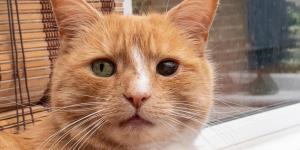
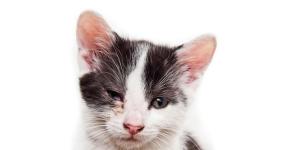
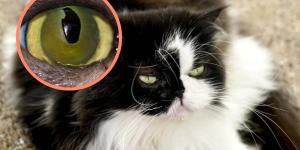



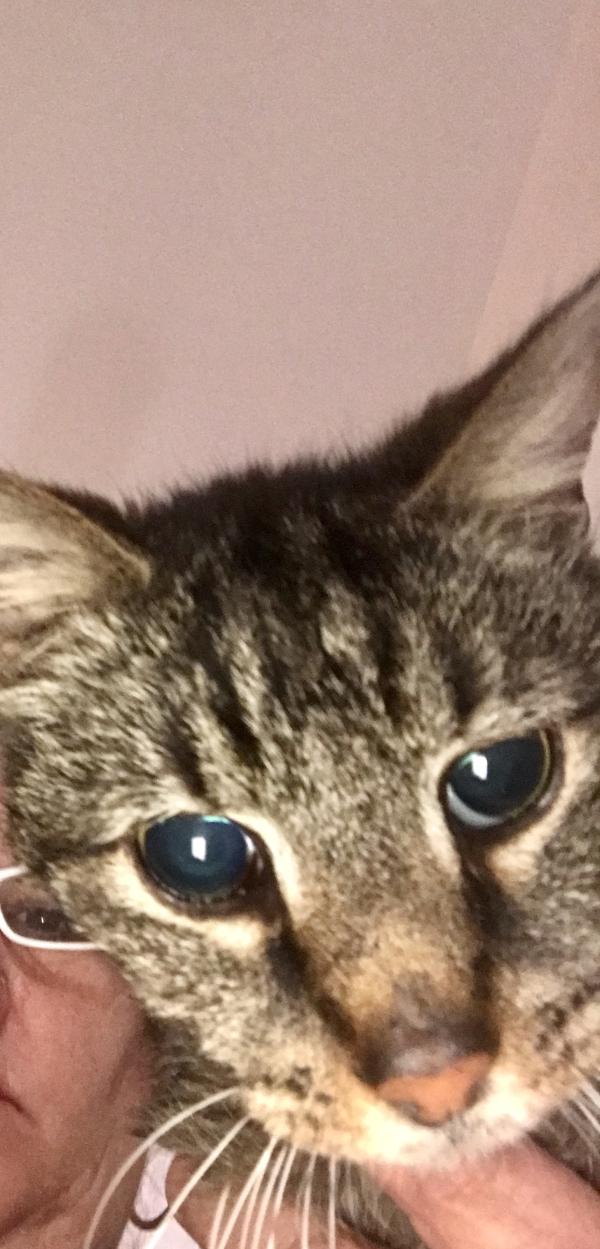 My elderly cat has hugely dilated eyes and is walking into things. He has thyroid disease already and is on meds. Worried that this isnt good. Headed to vets....
My elderly cat has hugely dilated eyes and is walking into things. He has thyroid disease already and is on meds. Worried that this isnt good. Headed to vets....

 My cat has always had dialated pupils since she got fixed but she has no problems except for vomiting sometimes she did it alot on carpets and still does it rarely but she seems fine to me except for the pupils
My cat has always had dialated pupils since she got fixed but she has no problems except for vomiting sometimes she did it alot on carpets and still does it rarely but she seems fine to me except for the pupils 
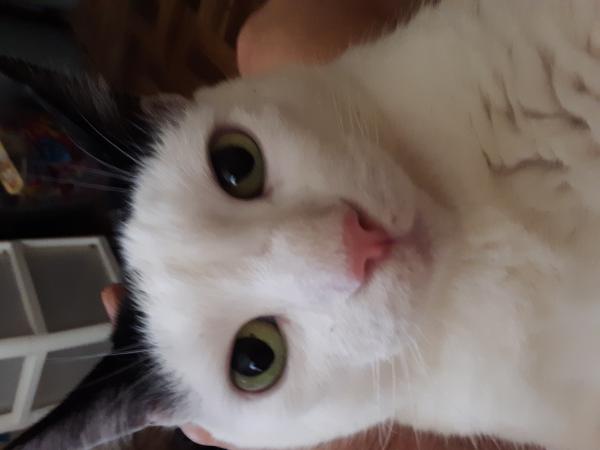 i need help my cat is poisoned over & over by roommate touching his nose & inner ear with something on his hand also by walking on floor that poison is on i need to move can you help me please he is my beloved pet that loves me he also puts poison in his carrier i know because my cat gets sick afterwards with same symptoms black eyes diarhea i wipe off his paws & nose but it is getting old & they are going to kill my sweet beloved fido
i need help my cat is poisoned over & over by roommate touching his nose & inner ear with something on his hand also by walking on floor that poison is on i need to move can you help me please he is my beloved pet that loves me he also puts poison in his carrier i know because my cat gets sick afterwards with same symptoms black eyes diarhea i wipe off his paws & nose but it is getting old & they are going to kill my sweet beloved fido
